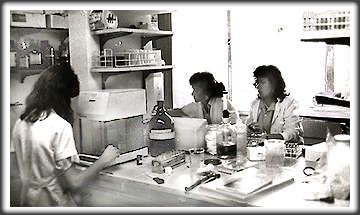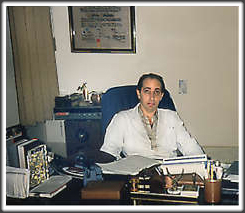
Dr. Lechin´s team has demonstrated the existence of (at least) four physiopathologic neuroendocrine profiles:
1.- Endogenous (major) depression; As these profiles are often very difficult to distinguish clinically, it is important to observe that neuro-pharmacological therapy can not be prescribed just on the basis of symptoms. Significantly, findings have demonstrated that neuroendocrine profiles and symptoms are both modified by neuropharmacological drugs in doses much lower than those usually prescribed by doctors. Furthermore, even in such low doses this therapy is applied only until the neuroendocrine profile is normalized. Investigations show parallelism between clinical improvement and neuroendocrine normalization. Immunological investigations performed routinely by the psychoimmunological section of the Institute of Experimental Medicine include measurement of peripheral lymphocyte subsets, NK cytotoxicity, concavalin test, antinuclear antibodies, as well as tests for discarding and identifying autoimmune diseases. These show that SLE, rheumathoid arthritis, Crohn´s disease and other (Th1) autoimmune illnesses present neuroendocrine profiles similar to those of major depressed patients. Conversely, the profiles of severely diseased patients (cancer, pancreatitis, gastroduodenal ulcer, ulcerative colitis, etc) as well as Th2 autoimmune diseases (myasthenia gravis, thrombocytopenic purpura, bronchial asthma, haemolytic anemia, etc) present neuroendocrine profiles similar to those of maladapted to stress patients. These cases also show evidences of immunological suppression. Diseases showing predominantly enhancement of humoral immunological activity likewise present a neuroendocrine profile typical of subjects maladapted (uncoping) to stress.

This research has guided Dr. Lechin and his team to successful neuropharmacological treatments for many psychiatric, psychosomatic and somatic illnesses; for example, augmenting the central noradrenergic activity and inhibiting adreno-medullary activity in patients maladapted to stress (immuno-suppressed). In such cases it is often necessary to reduce the high levels of free serotonin in plasma as this free monoamine is taken up by the macrophages, paralyzing their activity. On the other hand, the treatment of patients with a major depression profile is successfully addressed by increasing (replenishing) the exhausted store of their central serotonin at the same time as reducing their central noradrenergic system activity. Autoimmune disorders are effectively manipulated with neuropharmacological drugs to increase the levels of plasma free serotonin and reduce the levels of plasma noradrenaline. In November 11th, 1996, Dr. Lechin was affected by ocular myasthenia gravis. Top consulted US specialists, suggested immunosuppressive therapy. Rather than undergoing into long and destructive chemotherapy, Dr. Lechin studied his neuroendocrine plus immunological profile and found it resembled one of maladapted to stress. He treated himself with neuropharmacological drugs and his symptoms disappeared within two weeks. |
| COPYRIGHT © 1997 FUAD LECHIN |
 Research
work by Dr. Lechin and his colleagues at the Institute of Experimental
Medicine in the UCV Medical School is conducted in a laboratory equipped
to assay all circulating neurotransmitters, hormones and metabolites
(adrenaline, dopamine, noradrenaline, platelet serotonin, plasma serotonin,
MHPG, HVA, VMA, 5-HIAA, aminoacids, cortisol, prolactin, growth hormone,
etc.). These parameters have been measured in more than 30000 subjects
(normal, severely diseased, depressed, stressed and psychosomatic patients).
In addition, the effects of neuropharmacological drugs (clonidine, dopaminergic
blocking agents, alpha adrenergic blocking agents, monoamine precursors,
amphetamine, buspirone, hydantoin, serotonin uptake blockers, noradrenaline
uptake blockers, dopamine uptake blockers, serotonin uptake enhancers,
etc) on circulating neurotransmitters are investigated during exacerbation
and improvement periods, as well as during resting and various stressful
challenges (glucose, orthostasis, physical, emotional and mental exercise).
Research
work by Dr. Lechin and his colleagues at the Institute of Experimental
Medicine in the UCV Medical School is conducted in a laboratory equipped
to assay all circulating neurotransmitters, hormones and metabolites
(adrenaline, dopamine, noradrenaline, platelet serotonin, plasma serotonin,
MHPG, HVA, VMA, 5-HIAA, aminoacids, cortisol, prolactin, growth hormone,
etc.). These parameters have been measured in more than 30000 subjects
(normal, severely diseased, depressed, stressed and psychosomatic patients).
In addition, the effects of neuropharmacological drugs (clonidine, dopaminergic
blocking agents, alpha adrenergic blocking agents, monoamine precursors,
amphetamine, buspirone, hydantoin, serotonin uptake blockers, noradrenaline
uptake blockers, dopamine uptake blockers, serotonin uptake enhancers,
etc) on circulating neurotransmitters are investigated during exacerbation
and improvement periods, as well as during resting and various stressful
challenges (glucose, orthostasis, physical, emotional and mental exercise).
 Such
pharmacological manipulations require a thorough understanding of the
central and peripheral autonomic nervous system intimate mechanisms
triggered by small doses of neurochemical agents. This implies an interdisciplinary
approach based on knowledge of neurophysiology, neuropharmacology, neurochemistry,
etc. Up to the present, Dr. Lechin´s team has introduced and tested
successful therapies for many diseases including ulcerative colitis,
Crohn´s disease, irritable bowel syndrome, pancreatitis, bronchial asthma,
sleep apnea, headache syndromes, trigeminal neuralgia, insomnia, narcolepsy,
vertigo, non organic infertility, fibrocystic mastitis, functional amenorrhea,
depression, mania, somatoform disorders, postraumatic stress disorder,
Gilles de la Tourette disease, hyperkinetic children. The wide experience
acquired in the treatment of cancer has been presented at the M.D. Andersen
Cancer Center at Houston, A. James Cancer Hospital at the Ohio State
University, South Florida University (Tampa), University of Buenos Aires,
and many other cancer hospitals. All attending oncologists classed these
results as impressive. However, they admitted to be unable to manage
those neuropharmacological agents. Furthermore they were not able to
obtain patients´ neuroendocrine plus immunological profiles, parameters
so necessary for guiding this sophisticated and precise therapy.
Such
pharmacological manipulations require a thorough understanding of the
central and peripheral autonomic nervous system intimate mechanisms
triggered by small doses of neurochemical agents. This implies an interdisciplinary
approach based on knowledge of neurophysiology, neuropharmacology, neurochemistry,
etc. Up to the present, Dr. Lechin´s team has introduced and tested
successful therapies for many diseases including ulcerative colitis,
Crohn´s disease, irritable bowel syndrome, pancreatitis, bronchial asthma,
sleep apnea, headache syndromes, trigeminal neuralgia, insomnia, narcolepsy,
vertigo, non organic infertility, fibrocystic mastitis, functional amenorrhea,
depression, mania, somatoform disorders, postraumatic stress disorder,
Gilles de la Tourette disease, hyperkinetic children. The wide experience
acquired in the treatment of cancer has been presented at the M.D. Andersen
Cancer Center at Houston, A. James Cancer Hospital at the Ohio State
University, South Florida University (Tampa), University of Buenos Aires,
and many other cancer hospitals. All attending oncologists classed these
results as impressive. However, they admitted to be unable to manage
those neuropharmacological agents. Furthermore they were not able to
obtain patients´ neuroendocrine plus immunological profiles, parameters
so necessary for guiding this sophisticated and precise therapy.